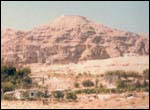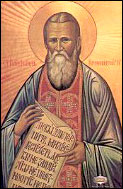 |
 |
|
 |
 |
|
|
 |
|
|
|
“Moses stayed with God for forty days and forty nights” (Exodus 34: 28).
|
|
Even in the Old Testament we already find 40-day fasts; all of them were caused by special circumstances, had a special assignment from God and bore special fruit. In the very beginning of the Old Testament we read about Moses, the meekest of all people on earth, that he “had seen God face-to-face.” From the very beginning of his difficult assignment - the terrible struggle with a people who angered the Lord their God, - he ascended a mountain and “he was there with the Lord forty days and forty nights; he did neither eat bread, nor drink water; and he wrote upon the tables the words of the covenant, the ten commandments” (Ex. 34:28).
For a short while he left his worldly affairs and concerns and ascended straight up to the Lord. He saw Him, took pleasure in Him, was transfigured by Him, so that his face shone for a long time afterwards, and spent time with Him alone, in this wondrous and continuous communion, obeying His will and listening to His words, for forty days and forty nights! What an extraordinary fast! A fast of close communion and mystic conversation with God.
How was Moses able to see God? We are not told about it; it is impossible to describe in words. But we know for a certainty that this meeting did take place, and it left an indelible trace. His face began to shine because God had spoken with him, and his soul, which had appeared before the Heavenly Father, took on power and grace for the remainder of his life. This was a fast of a close meeting with God.
And what about our fast? Does it consist of seeking the Face of God, as King David said: “Thou art my God; from early morning will I seek Thee, my soul thirsteth for Thee…. to see Thy power and Thy glory” (Psalm 63:1-2). Do we seek private conversation with God (prayer), which comprises the mystic power of Christian life? A fast pleasing to God is the soul’s intimacy and communion with Him, and to this fast was not only Moses summoned, but each one of us as well.
From “Day by day” - diary of an Orthodox priest.
|
|
The Great Fast - our exile
“By the rivers of Babylon, there we sat down,
yea, we wept, when we remembered Zion.”
In these words of the Lenten psalm, we Orthodox Christians, the New Israel, remember that we are in exile. For Orthodox Russians banished from Holy Russia, the psalm has a special meaning; but all Orthodox Christians, too, live in exile in this world, longing to return to our true home, Heaven. For us the Great Fast is a season of exile ordained for us by our Mother, the Church, to keep fresh in us the memory of the Zion from which we have wandered so far. We have deserved our exile and we have great need of it because of our great sinfulness. Only through the chastisement of exile, which we remember in the fasting, prayers, and repentance of this season, do we remain mindful of our Zion.
“If I forget thee, O Jerusalem…”
Weak and forgetful, even in the midst of the Great Fast we live as though Jerusalem did not exist for us. We fall in love with the world, our Babylon; we are seduced by the frivolous pastimes of this “strange land” and neglect the services and discipline of the Church which remind us of our true home. Worse yet, we love our very captors - for our sins hold us captive more surely than any human master - and in their service we pass in idleness the precious days of Lent when we should be preparing to meet the rising sun of the New Jerusalem - the Resurrection of our Lord Jesus Christ.
There is still time; we must remember our true home and weep over the sins which have exiled us from it. Let us take to heart the words of St. John of the Ladder: “Exile is separation from everything in order to keep the mind inseparable from God. Exile loves and produces continual weeping.” Exiled from Paradise, we must become exiles from this world if we hope to return. This we may do by spending these days in fasting, prayer, separation from the world, attendance at the services of the Church, in tears of repentance, in preparation for the joyful Feast that is to end this time of exile; and by bearing witness to all in this “strange land” of our remembrance of that even greater Feast that shall be when our Lord returns to take home His people to the New Jerusalem, from which there shall be no more exile, for it is eternal.
Father Seraphim Rose.
|
|
The original sin
Some people say: it does not matter if one eats non-lenten food during lent, fasting does not pertain only to food; it does not matter if one wears beautiful and expensive clothes, goes to the theater, to the dances, buys magnificent furniture, chinaware, keeps savings accounts, etc.; but - for what reason does our heart turn away from God, the Source of life, for what reason do we lose eternal life? Is it not because of gluttony, because of expensive clothing, like the rich man of the Gospel, because of our passion for luxuries? Is it possible to serve God and mammon, to be a friend both to the world and to God, to serve Christ and the devil? Totally impossible. For what reason did Adam and Eve lose paradise and embraced sin and death? Was it not from a single food? Look carefully at the reason why we disregard the salvation of our souls, for which the Son of God had payed such a high price, why we pile sin upon sin, why we constantly find ourselves in opposition to God, why we fall into a life of vanity. Is it not because of our attachment to worldly things, particularly to worldly luxuries? For what reason do our hearts coarsen and we become flesh, instead of spirit, distorting our moral nature? Is it not because of passion for food, drink and other earthly goods? After all of this, how is it possible to say that it does not matter if one does not fast during lent? The very fact that we say such a thing is an expression of pride, vanity, disobedience to God and abandonment of Him.
|

The 40-day mountain. |
Whoever rejects fasting, forgets why the fall of the first people occurred (from intemperance) and what a weapon against sin and the tempter was indicated to us by the Saviour when he was tempted in the desert, (fasting for forty days and nights); such a person does not know or does not wish to know that man falls away from God primarily due to intemperance, as happened with the inhabitants of Sodom and Gomorrah and with the contemporaries of Noah, - because all kinds of sin appear among people as a result of imtemperance.
|
|
|
Whoever rejects fasting - denies himself and others a weapon against his multi-passioned flesh and against the devil, both of them garnering strength against us particularly through our intemperance; such a one is not a soldier of Christ, for he throws in his weapon and willingly gives himself up into the imprisonment of his sin-loving flesh; finally, such a one is blind and does not seen the relationship between the causes and the consequences of actions.
|
| * * * |
|
A Christian should fast in order to purify his mind, encourage and develop his emotions, and incite his will to the doing of good. These three abilities of man we obscure and suppress primarily through gluttony, drunkenness and earthly cares, and subsequently we fall away from the source of life, which is the Lord God, and we fall into corruption and vanity, whereby we pervert and defile the image of God in ourselves. Gluttony and lechery nail us down to earth and clip our soul’s wings. And yet regard the high ascent achieved by all those who engaged in fasting and abstinence! They soared like eagles; they, earthly beings, lived with their minds and hearts in the heavens, heard ineffable things there, and learned divine wisdom there. Yet how does man humiliate himself by gluttony and drunkenness!
|

St. John of Kronstadt |
|
He corrupts his nature, created in God’s image, and becomes comparable to mute beasts, and sometimes descends even lower. O, woe unto us for our passions, for our iniquitous habits! They prevent us from loving God and our neighbors, and from fulfilling God’s commandments; they plant within us a criminal self-love of the flesh, whose end is eternal damnation. Thus a drunkard does not hesitate to spend a great deal of money on his bodily pleasure and satiety, yet begrudges pennies for the poor; those who love to dress luxuriously, or who love to buy fashionable furniture and expensive china spend an enormous amount of money on clothes and furnishings, yet walk by the poor with coldness and disdain; those who love to eat well do not hesitate to spend tens and thousands of rubles on fine dining, yet begrudge the poor even a brass farthing. It is also necessary for a Christian to fast because, through the incarnation of the Son of God, human nature has become spiritual, sacred, and we hurry towards the heavenly realm, which is not food and drink, but righteousness and peace and joy in the Holy Spirit. To eat and to drink, i.e. be addicted to sensual pleasures, is characteristic only of pagans, who, not being cognizant of spiritual heavenly pleasures, look upon the satisfaction of the belly – indulgence in food and drink – as the prime pleasure in life. It is for this reason that the Lord denounces this ruinous passion so frequently in the Gospel.
From the spiritual diary of St. John of Kronstadt,
“My Life in Christ”
|
|
 |
|
|
|
|
 |